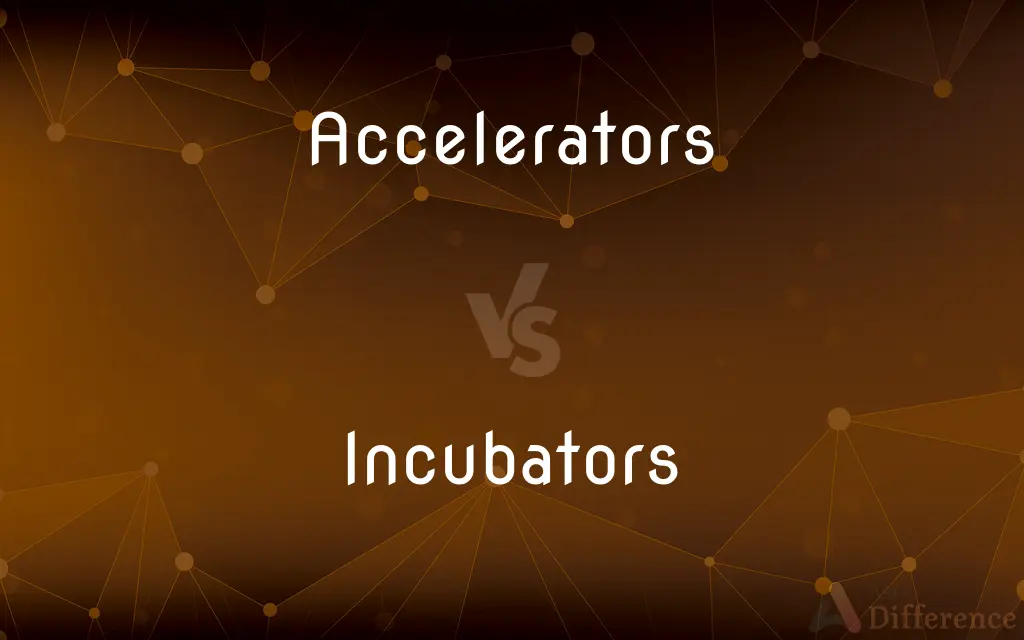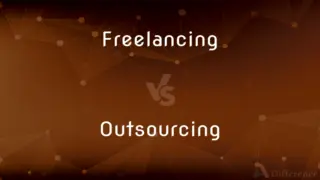Accelerators vs. Incubators — What's the Difference?
By Tayyaba Rehman & Urooj Arif — Published on July 30, 2024
Accelerators fast-track growth and development of startups through mentorship, funding, and resources for a fixed term, while incubators nurture early-stage companies by providing workspace, guidance, and support without a set timeframe.

Difference Between Accelerators and Incubators
Table of Contents
ADVERTISEMENT
Key Differences
Accelerators are intensive programs that help startups scale quickly by providing mentorship, capital, and resources, often in exchange for equity, over a fixed period, typically 3-4 months. They focus on rapid growth and aim to get startups ready for investment rounds. Incubators, on the other hand, offer a more nurturing environment for early-stage companies, providing office space, business services, and access to a network of experts and mentors. They do not usually have a set timeframe and are more flexible in terms of the support they offer, often not requiring equity in return.
Accelerators typically have a competitive selection process and a set program length, aiming to push startups to achieve rapid growth and development within this timeframe. This often includes pitch days or demo days where startups present their progress to potential investors. Incubators, whereas, may accept startups more broadly and focus on long-term development, offering a more flexible timeline that can vary greatly depending on the needs of the business.
While accelerators often provide a seed investment in exchange for equity, incubators might not offer direct funding. Instead, they focus on providing valuable resources, mentorship, and sometimes free or low-cost workspace to help startups develop their business model and strategy without the immediate pressure of investor expectations.
The goal of an accelerator is to help a startup grow quickly and become investment-ready by the end of the program, making them ideal for businesses looking to scale rapidly. Incubators, on the other hand, aim to assist entrepreneurs in refining their ideas and developing a sustainable business model over a more extended period, making them better suited for early-stage startups still in the conceptual or development phase.
The community and network that accelerators and incubators provide vary significantly. Accelerators often have a more intensive networking component, connecting startups with investors, mentors, and alumni throughout the program. Incubators offer a supportive community and access to a network of business professionals and advisors, but the focus is more on internal development than external funding and scaling.
ADVERTISEMENT
Comparison Chart
Objective
Fast-track startup growth for investment readiness
Nurture early-stage startups' development
Duration
Fixed term (3-4 months)
Flexible, no set timeframe
Equity
Often require equity in exchange for funding
Rarely require equity
Funding
Provide seed investment
May not offer direct funding
Target Stage
Startups ready to scale rapidly
Early-stage or conceptual startups
Compare with Definitions
Accelerators
An accelerator program that admits startups in groups or cohorts.
We were part of a spring cohort-based program focused on fintech innovations.
Incubators
A support system for early-stage startups offering workspace, mentorship, and resources.
The startup incubator provided us with the resources to turn our idea into a prototype.
Accelerators
The final event in an accelerator program where startups pitch to investors.
Our team is preparing for Demo Day to attract our next round of funding.
Incubators
Incubators catering to startups in specific sectors.
The biotech incubator offered us specialized lab space and industry connections.
Accelerators
An accelerator emphasizing guidance from industry experts.
The mentorship-driven accelerator matched us with mentors who drastically pivoted our business model.
Incubators
Incubators operating to support startups without taking equity.
We joined a non-profit incubator focused on social entrepreneurship.
Accelerators
Accelerators that provide funding in exchange for a percentage of equity.
They entered an equity-based accelerator, trading 6% of their company for seed capital.
Incubators
A shared office environment often provided by incubators.
Our team thrived in the co-working space, surrounded by other entrepreneurs.
Accelerators
A program designed to fast-track the growth of startups through investment and mentorship.
The startup joined a seed accelerator to gain capital and mentorship.
Incubators
Guidance and advice provided by incubators to nurture startup growth.
Through business mentorship, we refined our business model and strategy.
Accelerators
A device, especially the gas pedal of a motor vehicle, for increasing speed.
Incubators
An apparatus in which environmental conditions, such as temperature and humidity, can be controlled, often used for growing bacterial cultures, hatching eggs artificially, or providing suitable conditions for a chemical or biological reaction.
Accelerators
Plural of accelerator
Incubators
A place or situation that permits or encourages the formation and development, as of new ideas
A university that was an incubator of new approaches to sociology.
Incubators
An organization that provides new businesses with technical and support services and usually low-cost office space or infrastructure.
Incubators
Plural of incubator
Common Curiosities
Do accelerators take equity in startups?
Yes, accelerators often require equity in exchange for funding and resources.
What kind of support do incubators provide?
Incubators provide workspace, mentorship, business services, and access to a network of experts without necessarily offering direct funding.
How long do startups stay in an accelerator?
Startups typically stay in an accelerator for a fixed term, usually 3-4 months.
Can a startup join both an incubator and an accelerator?
Yes, a startup can transition from an incubator to an accelerator as it progresses and its needs change.
Can any startup join an incubator?
Incubators generally target early-stage or conceptual startups, offering more flexible acceptance criteria than accelerators.
Are accelerators better than incubators?
Neither is inherently better; the choice depends on the startup's stage and needs. Accelerators are suited for rapid scaling, while incubators are better for early development.
Do incubators provide funding?
Incubators typically do not provide direct funding but may help startups access funding sources.
What is a demo day?
A demo day is an event at the end of an accelerator program where startups pitch to investors.
How do incubators make money?
Incubators can be funded through government grants, private sponsors, or service fees, and do not usually take equity.
Can incubators help with patenting and intellectual property?
Yes, many incubators provide resources or guidance on protecting intellectual property.
What is the main difference between accelerators and incubators?
Accelerators focus on rapid growth and investment readiness over a short period, while incubators nurture early-stage startups' development without a set timeframe.
What is the selection process for accelerators?
The selection process is competitive, focusing on the startup's potential for rapid growth and scalability.
Are there industry-specific accelerators and incubators?
Yes, some focus on specific industries, offering tailored support and resources.
How does mentorship work in accelerators and incubators?
Both provide access to mentors, but accelerators focus on rapid scaling advice, while incubators offer long-term business development guidance.
What is a cohort-based program?
A cohort-based program admits groups of startups simultaneously, fostering a community and shared learning experience.
Share Your Discovery

Previous Comparison
Patio vs. Pergola
Next Comparison
Freelancing vs. OutsourcingAuthor Spotlight
Written by
Tayyaba RehmanTayyaba Rehman is a distinguished writer, currently serving as a primary contributor to askdifference.com. As a researcher in semantics and etymology, Tayyaba's passion for the complexity of languages and their distinctions has found a perfect home on the platform. Tayyaba delves into the intricacies of language, distinguishing between commonly confused words and phrases, thereby providing clarity for readers worldwide.
Co-written by
Urooj ArifUrooj is a skilled content writer at Ask Difference, known for her exceptional ability to simplify complex topics into engaging and informative content. With a passion for research and a flair for clear, concise writing, she consistently delivers articles that resonate with our diverse audience.












































